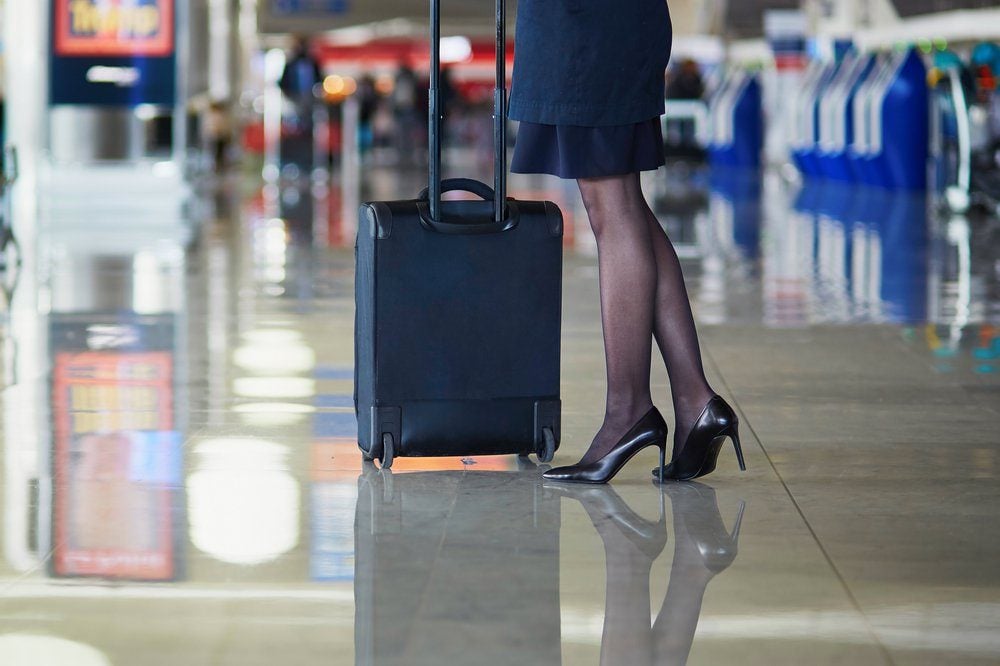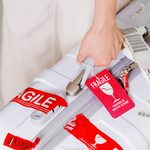Flight Attendants Reveal How They Never Get Sick
You're going to want to steal these tips.

Airplanes are pretty gross. Between a lot of people, and even more germs, you should definitely think twice before touching the air vents on a plane (and other don’ts on an airplane). Flight attendants don’t have much of a choice in the matter, though, and are constantly exposed to a barrage of bacteria. Yet somehow, they never get sick.
If you’re the type of person who feels sick after a single one-hour flight, you may be wondering how cabin crew members manage to stay healthy, despite being incredibly frequent flyers. Well, wonder no more, because several flight attendants have revealed how they never get sick at work and how you can adopt the same strategies.
Stay hydrated
Taylor Strickland, the lead cabin attendant for Alerion Aviation, has only called in sick once during her career. Her top tip? Drink “a ton of water” while flying. “It’s dehydrating to fly, and if you’re dehydrated, your body’s a little weaker, which makes it harder to fight off the germs you’re encountering,” she tells Reader’s Digest. Similarly, Lauren Guilfoyle, a cabin crew member for Emirates Airline says that she buys a litre of water before each flight and drinks it during the trip.
But avoid tap water, coffee, or tea
Even though you should definitely stay hydrated, it’s best to avoid these food and beverages on an airplane. Among other things, a 2015 study on the water quality on airplanes found that the water tanks are “conducive for microbial growth.” Instead, ask for bottled water or bring your own.
Use moist towelettes on your hands
Not only is it refreshing to clean your hands with some wet wipes or moist towelettes, but it also helps keep germs at bay. In addition to wet wipes, Guilfoyle also stays refreshed by using a hydrating mist and putting argan oil on her face.
Take an immune system support supplement
Even though the immune system booster Airborne lacks the science to back up the product’s claims, people still swear by it as a way to prevent getting sick. Strickland is one of those people and says that she always keeps it stocked on the plane as a preemptive measure. “It’s great because they make the small packets to travel with and now they make gummies,” she notes.
Disinfect the plane’s surfaces
Unfortunately, many parts of airplanes aren’t cleaned the way they should, so sometimes you need to take matters into your own hands. Strickland always carries around travel packs of wet wipes, and during a flight, she wipes down surfaces with disinfectant wipes to disinfect as much as possible. (Psst—this is the right way to germ-proof your plane seat.)
But never eat directly off of tray tables
While it’s a good idea to bring your own antibacterial wipes and clean your tray table, you’re still safer not eating off of it directly. “The dirtiest part of the plane has to be the tray tables—people constantly lay their heads, change babies’ diapers, and rest their feet on them,” a flight attendant for JetBlue told Business Insider. “I wouldn’t eat off of that even after sanitizing it.”
Juice it up
Strickland is also a fan of drinking different green juices that incorporate ingredients like ginger and lemon. “Most may think they’re a fad, but it helps me get different nutrients on the go,” she says.
Try to relax and de-stress
There is definitely a connection between stress and your health, so you’re best off avoiding it whenever possible. One way that Guilfoyle does this is by using a few drops of lavender essential oils to relax.
Avoid caffeine
As tempting as it is to grab a cup of coffee before an early-morning flight, Guilfoyle advises against it. “Avoid caffeine and alcohol as they are a major cause of dehydration,” she says. “Instead, try a fruit juice to keep you hydrated during your trip.” Watch out for 14 more things you shouldn’t do on an airplane.
Eat fruits and raw vegetables
Instead of reaching for processed snack food, Guilfoyle suggests something healthier. “Water-based foods, like fruits and raw vegetables, will not only keep you hydrated and prevent puffiness, but will also give you the added boost of important antioxidants, fibre, and other nutrients,” she says.
Get—or stay—in shape
This is good advice regardless of whether or not you’re getting on an airplane, but Guilfoyle says that exercising regularly can help you stay healthy when you fly. “Maintaining a healthy lifestyle is extremely important in order to help cope with the physical demands of flying and constant change in time zones,” she explains. “We regularly experience body clock changes, irregular sleeping patterns, and long haul flying which can disrupt our systems. As a result, a regular dose of good nutrition and consistent exercise helps our bodies remain at their optimum levels.” (Here are 12 easy ways to avoid jet lag.)
But don’t exercise right after a flight
Though it may seem like a good idea to hit the gym as soon as you reach your destination, flight attendant Sophie Jones says that it’s actually not. “There’s no point pushing your body to work out when it hasn’t had enough rest, rehydration, and time to acclimatize itself to a new time zone,” she told British Elle.
Nap during your flight
While this isn’t always an option for flight attendants, getting in a quick nap while you’re flying can keep you energized and help you avoid jet lag. That’s why Heather Sanchez, a flight attendant for Hawaiian Airlines, told Women’s Health that she recommends creating a cat nap kit to stow in your carry-on luggage containing a neck pillow, noise-canceling headphones, and an eye mask with built-in eye cavities to block out light without smudging your mascara.
Next, check out the cleanest airlines in the world.



